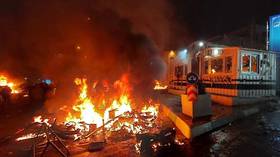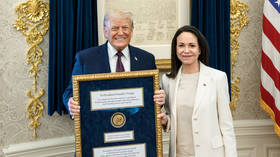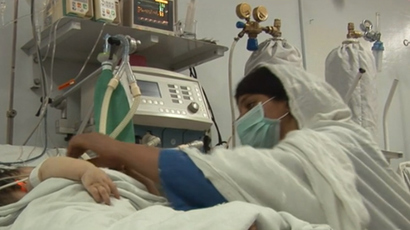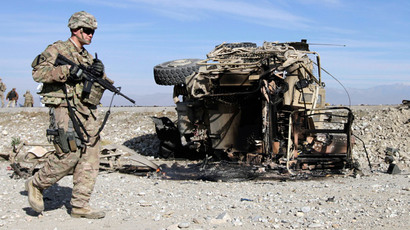Afghan conference: World leaders worry over dwindling aid & Taliban resurgence
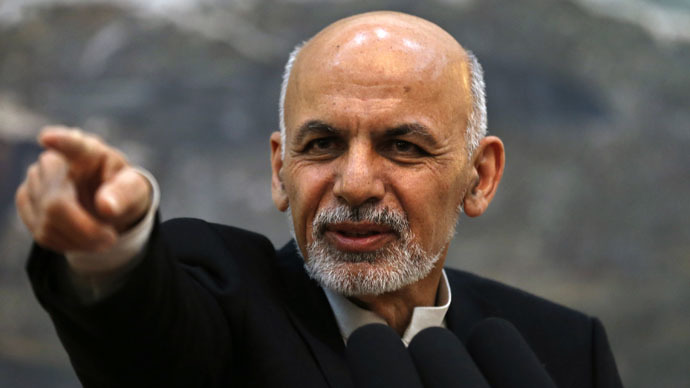
Afghanistan's president is urging world leaders not to abandon his country but instead make long-term commitments amid the withdrawal of most foreign troops and a surge in Taliban attacks.
President Ashraf Ghani and British Prime Minister David Cameron are jointly hosting a conference in London on security, corruption and political reform in Afghanistan.
US Secretary of State John Kerry, Pakistani Prime Minister Nawaz Sharif and international diplomats are also attending the two-day event. Experts have warned security is deteriorating in Afghanistan and that humanitarian funds are drying up.
In his opening address, UK Foreign Secretary Philip Hammond said: “We should also remember all the Afghan and international civilians who have been killed as a result of the conflict, including Ronnie Jessiman and Tawab Sediqi, British Embassy staff killed in an attack on their car, only last week.”
Ghani was finally elected in September after a drawn-out election process. However, he and his former rival and now coalition partner, Abdullah Abdullah, the de facto prime minister, are yet to agree on the make-up of a stable cabinet.
Meanwhile, there has been a rise in the number of attacks over the last few months carried out by Taliban fighters, targeting foreigners, NGOs and Afghan forces in Kabul and beyond.
Last week, two US soldiers and two British embassy workers were killed in separate attacks, as well as dozens of Afghans killed and injured. The week before, around 50 people were killed when a suicide bomber attacked spectators at a volleyball match near the border with Pakistan.
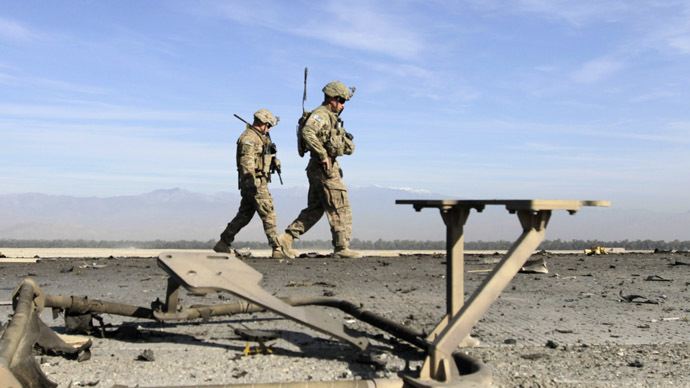
Foreign troops, including from Britain and the US, are withdrawing from Afghanistan by the end of the year after a 13-year combat mission, in which 453 UK service personnel were killed.
However, Ghani has signed security agreements with Washington and NATO permitting an international military presence after December 31. US President Barak Obama announced some 10,000 American troops will remain in Afghanistan.
Delegates from more than 50 countries are in London for talks intended to boost Afghanistan's prospects and to discuss the challenges faced by the nation.
Although the number of Taliban attacks is increasing, Hammond praised the achievements made so far.
“Those who have strived to achieve security and development in Afghanistan can take great pride in what has been achieved,” he said. “Pride that the terrorist threat from the region has been substantially reduced.”
Although there is no stable Afghan cabinet as of yet, Hammond added: “Pride that after 30 years of war, Afghanistan has a constitution, a democratic system of government and a long term strategy for its future. Pride that the country has recorded its first ever peaceful political transition.
“And President Ghani and Chief Executive Abdullah Abdullah in particular can be proud of the statesmanship they have shown in enabling the country to reach that point.”
READ MORE:British embassy vehicle hit in suicide attack in Kabul; at least 5 killed
Hammond said Afghanistan entered a new chapter in history and now stands at the beginning of a ‘Transformation Decade.’
Nearly 30 percent of Afghans now have reliable access to power compared to 6 percent in 2002, ensuring that 6.7 million children can attend school, “more than 2.5 million of whom are girls who, under the Taliban, would have had no such opportunity.”
Some 60 percent of the population are now within two hours’ walk of a public health facility, whereas in 2002 only 10 percent had any access to health services.
“But we should not underestimate the scale of the challenges ahead nor the enduring need for a strong partnership between Afghanistan and the international community. While much has been achieved, there is much, much, more to do,” Hammond warned.
“The Afghan economy is a war bubble and we are seeing it slowly deflate,” Graeme Smith, senior analyst at the International Crisis Group, told the Guardian. “While we’re putting Afghanistan through these shocking political and military transitions, it behoves us to try to ease the economic transition – to smooth the way with some cash.”
“When you don’t have fresh-faced British soldiers whose lives are at risk, it’s much easier to turn off the tap,” Smith said. “And that’s the real danger now for Afghanistan: that the world will forget.”
READ MORE:Britain’s 13yr stay in Afghanistan ends as US, UK hand over military bases
Afghanistan depends on foreign assistance for two-thirds of its budget and is said to make a bid for long-term foreign financial support at the conference.
“As Afghanistan has a commitment to introduce reforms, it will tell the international community, in particular, donors at the meeting, that this is our agenda for reform and based on it, they should assist and support us,” presidential spokesman Nazifollah Salarzai told Afghan TV.
Meanwhile, a coalition of British and Irish charities warned the conference that a combination of cuts in their international funding and growing security fears among their staff threatens to diminish the progress that has been made in Afghanistan.
Umbrella advocacy group BAAG (British and Irish Agencies Afghanistan Group) said that 60 percent of aid organizations working in Afghanistan – some 30 groups – felt “less safe” over the past year, half had received death threats or had been intimidated, while more than 70 percent had seen development funding fall in the past year.
“There is a clear picture of people feeling abandoned, vulnerable, underfunded,” Jawed Nader, director of BAAG, told Reuters. “We risk leaving our colleagues in Afghanistan with a feeling of betrayal, that we are turning our back on them and leaving them exposed, both in terms of security and financially.”




